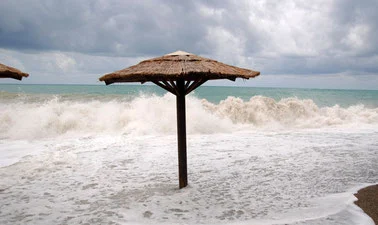
Tourism is one of the largest industries in the world, contributing significantly to the global economy, employment, and cultural exchange. However, the tourism industry is facing a significant threat from climate change.
Climate change affects tourism worldwide through extreme weather events, rising sea levels, and changing seasons, leading to a decline in tourist arrivals, revenue, and infrastructure damage. According to UNWTO, the tourism industry is responsible for around 8% of global greenhouse gas emissions; climate change will cost the tourism industry $1.4 trillion in lost revenue by 2050. (Source: World Travel & Tourism Council)
Also, according to the World Travel and Tourism Council, climate change could lead to a decline in global tourist arrivals by 1.8% by 2050. By 2030, climate change is projected to reduce snow cover in the European Alps by 30-70%, leading to a decline in winter tourism revenue by up to €1.4 billion annually. (Source: European Parliament)
A decline in 90% of coral reef tourism by 2100 due to Climate change could lead to a decline in coral reef tourism, as projected by the World Wildlife Fund. The above are some startling facts; plenty more could worsen the situation. The climate is changing rapidly, and tourism is getting impacted at an alarming rate due to submerged destinations, heat waves, droughts and many such natural calamities.
Extreme weather events are becoming increasingly common due to climate change, affecting tourism destinations worldwide. Hurricanes, floods, wildfires, and droughts can cause significant damage to tourist destinations, affecting their infrastructure, accessibility, and natural attractions. According to the World Tourism Organization (UNWTO), natural disasters and related crises cost the tourism industry an estimated $630 billion between 2000 and 2019.
For example, Hurricane Maria in 2017 caused massive damage to the tourism industry in Puerto Rico, leading to a decline in tourist arrivals and revenue. The 2019-2020 bushfires in Australia burned through many of the country’s most popular tourism destinations, such as Kangaroo Island and the Blue Mountains, leading to significant revenue losses.
Rising sea levels are another significant threat to the tourism industry, particularly in coastal areas. According to the Intergovernmental Panel on Climate Change (IPCC), sea levels could rise by up to 1 meter by the end of the century, impacting low-lying regions worldwide. As a result, many popular coastal destinations, such as the Maldives, the Seychelles, and the Florida Keys, could be significantly impacted.
According to a report by the World Bank, sea-level rise could lead to a 10-12% decline in tourism demand in the Caribbean, the Pacific Islands, and Southeast Asia. In addition, tourism destinations in these regions could experience significant losses in infrastructure due to rising sea levels, leading to a decline in tourist arrivals and revenue.
Climate change also affects the tourism industry by altering different regions’ seasons. For example, in some destinations, the winter season is becoming milder, affecting the demand for winter tourism. According to a report by the European Parliament, the winter tourism industry in the Alps is at risk due to rising temperatures, with a projected loss of up to 70% of snow cover in some areas by the end of the century. The report also notes that the European ski industry could lose up to €1.4 billion in revenue annually due to climate change.
In addition, changing weather patterns are affecting the timing and intensity of natural phenomena such as the migration of animals and the blooming of flowers. These changes impact the demand for ecotourism in some regions, leading to a decline in tourist arrivals and revenue.
The impact of climate change on the tourism industry is not limited to tourist destinations but also affects local communities. Tourism is a significant source of employment and income in many developing countries, particularly for rural and coastal communities. However, climate change can affect their livelihoods, leading to job losses, reduced income, and increased poverty.
For example, in the Caribbean, tourism is the primary source of income for many island nations, supporting over 2 million jobs. However, the region is highly vulnerable to climate change, with rising sea levels, hurricanes, and coral bleaching affecting tourist arrivals and the livelihoods of local communities.
Therefore, with all the devastating impacts of climate change leading to a fall in tourism and, thus, bringing huge losses to the tourism industry, it is essential to mitigate and reduce the loss to the industry.
Sustainable practices are crucial to mitigate climate change’s impact on the tourism industry. The tourism industry can play a vital role in reducing its carbon footprint by implementing sustainable practices, such as using renewable energy sources, reducing waste, and promoting sustainable transportation. Destinations can also develop sustainable tourism strategies that preserve natural resources and minimize environmental impact.
Sustainable solutions and efforts are essential to restore tourism and reduce climate change’s impact on the industry. Some of the mitigating measures are:
Implementing sustainable practices is one of the most crucial solutions to reduce the impact of climate change on the tourism industry. The tourism industry is responsible for around 8% of global greenhouse gas emissions, with transportation, accommodation, and activities being the most significant contributors. The tourism industry can significantly reduce its carbon footprint by implementing sustainable practices, such as using renewable energy sources, reducing waste, and promoting sustainable transportation.
For example, the Marriott International hotel chain has committed to reducing greenhouse gas emissions by 30% by 2025, focusing on reducing energy and water consumption, waste, and carbon emissions. The company has also implemented sustainable practices in its supply chain, such as sourcing locally and reducing packaging waste.
Developing climate-resilient infrastructure is also crucial to reduce the impact of climate change on the tourism industry. Climate-resilient infrastructure can withstand extreme weather events, rising sea levels, and other climate-related threats, ensuring that tourism destinations remain accessible and safe for tourists.
For example, the Maldives government has invested in climate-resilient infrastructure, such as seawalls and elevated walkways, to protect the country’s tourism industry from rising sea levels. The government has also implemented policies to promote sustainable tourism practices, such as banning single-use plastics in tourist resorts.
Promoting sustainable tourism practices is essential to reduce the impact of climate change on the tourism industry. Sustainable tourism practices focus on preserving natural resources, minimizing environmental impact, and supporting local communities. By promoting sustainable tourism practices, the tourism industry can reduce its environmental impact while supporting local communities and promoting cultural exchange.
For example, the Global Sustainable Tourism Council (GSTC) has developed a set of criteria for sustainable tourism, covering areas such as environmental management, cultural and social benefits, and economic benefits. Destinations and tourism operators can use these criteria to develop sustainable tourism strategies that preserve natural resources, support local communities, and minimize environmental impact.
Encouraging responsible tourism choices by tourists is also crucial to reduce the impact of climate change on the tourism industry. Responsible tourism choices involve choosing sustainable tourism practices when travelling, such as using public transportation, reducing waste, and supporting local communities.
For example, the Responsible Tourism Partnership has developed a set of principles for responsible tourism, covering areas such as reducing carbon emissions, supporting local communities, and respecting local cultures. Tourists can use these principles to make accountable tourism choices when travelling, supporting sustainable tourism practices and reducing the impact of climate change on the industry.
Investing in research and development is essential to develop innovative solutions to reduce the impact of climate change on the tourism industry. Research and development can focus on developing new technologies, such as renewable energy sources and low-carbon transportation, as well as new policies and practices to support sustainable tourism.
For example, the United Nations Development Programme (UNDP) has launched a project to develop sustainable tourism policies and practices in the Pacific Islands region, working with local communities and governments to identify sustainable tourism opportunities and develop climate-resilient tourism infrastructure.
The European Commission is undertaking similar efforts and has launched a project to promote sustainable tourism in the Mediterranean region, focusing on developing sustainable tourism strategies, promoting sustainable tourism practices, and raising awareness of the impact of climate change on the industry.
Therefore, restoring tourism and reducing the impact of climate change on the industry requires sustainable solutions and efforts. Implementing sustainable practices, developing climate-resilient infrastructure, promoting sustainable tourism practices, encouraging responsible tourism choices, and investing in research and development are all essential steps to reduce the impact of climate change on the industry.
Governments, the tourism industry, and tourists all have a role to play in restoring tourism and reducing the impact of climate change on the industry. By working together, we can ensure a sustainable and resilient future for the tourism industry while protecting the environment and supporting local communities.


